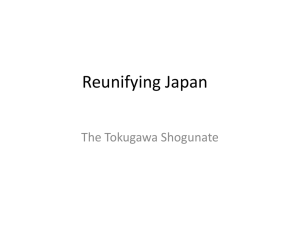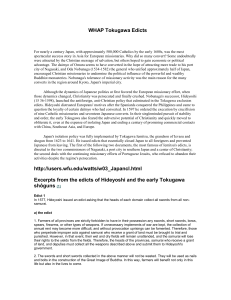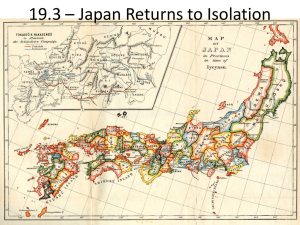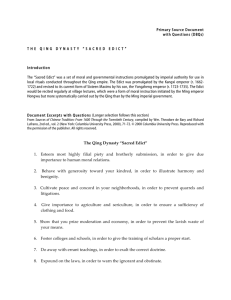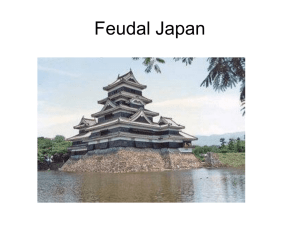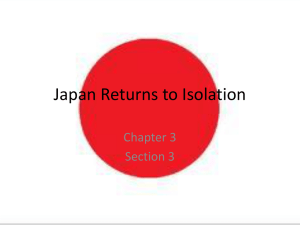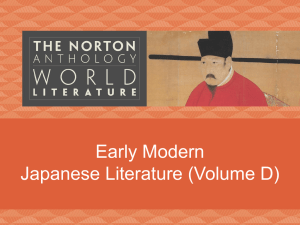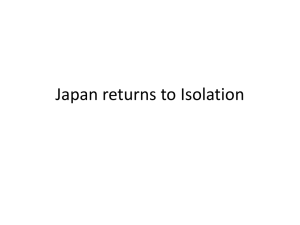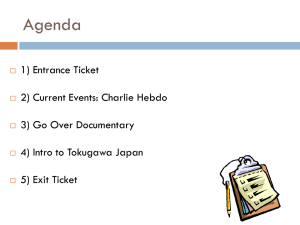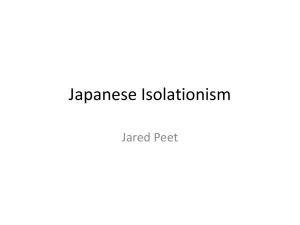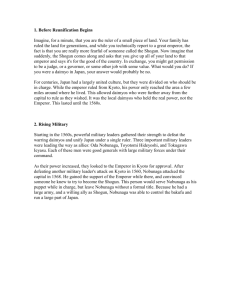Tokugawa - World History and Geography
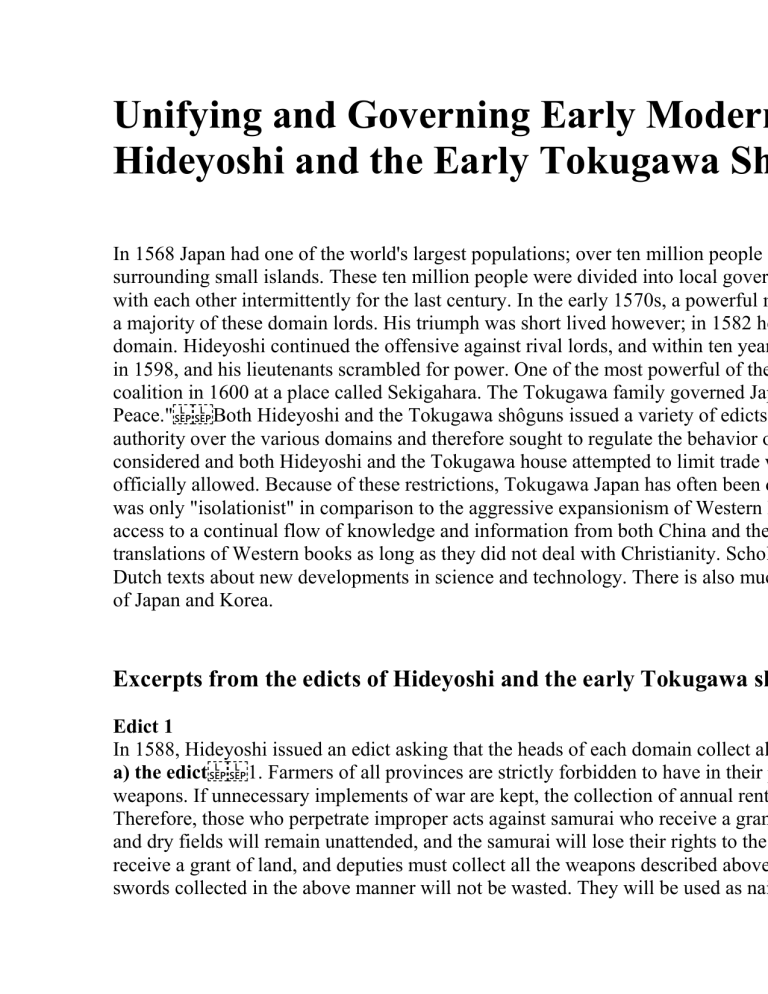
Unifying and Governing Early Modern Japan: Edicts of Toyotomi
Hideyoshi and the Early Tokugawa Shôguns
In 1568 Japan had one of the world's largest populations; over ten million people lived on the main islands of Honshû, Kyûshû and Shikoku, and the many surrounding small islands. These ten million people were divided into local governing domains, each ruled by a daimyô, a samurai lord. The lords had been at war with each other intermittently for the last century. In the early 1570s, a powerful military leader, Oda Nobunaga, managed with fierce ruthlessness to triumph over a majority of these domain lords. His triumph was short lived however; in 1582 he was murdered and one of his generals Toyotomi Hideyoshi inherited his domain. Hideyoshi continued the offensive against rival lords, and within ten years had managed to force all daimyô to accept his leadership. Hideyoshi died in 1598, and his lieutenants scrambled for power. One of the most powerful of them, Tokugawa Ieyasu, allied himself with other lords and defeated a rival coalition in 1600 at a place called Sekigahara. The Tokugawa family governed Japan for the next two and a half centuries, a period sometimes called "The Great
Peace." Both Hideyoshi and the Tokugawa shôguns issued a variety of edicts in their attempts to govern Japan. They were concerned with maintaining their authority over the various domains and therefore sought to regulate the behavior of both the military families and the farmers. International affairs also had to be considered and both Hideyoshi and the Tokugawa house attempted to limit trade with foreign countries. By 1639 only trade with Dutch and Chinese traders was officially allowed. Because of these restrictions, Tokugawa Japan has often been described as "isolationist." But recent studies of this period have noted that Japan was only "isolationist" in comparison to the aggressive expansionism of Western Europe. Indeed the sanctioned trade with the Chinese and the Dutch gave Japan access to a continual flow of knowledge and information from both China and the West. In 1721, Tokugawa Yoshimune lifted an import ban on Chinese translations of Western books as long as they did not deal with Christianity. Scholars in Japan began the arduous task of reading and translating Chinese and
Dutch texts about new developments in science and technology. There is also much evidence of unsanctioned trade between individual domains in the southwest of Japan and Korea.
Excerpts from the edicts of Hideyoshi and the early Tokugawa shôguns
(1)
Edict 1
In 1588, Hideyoshi issued an edict asking that the heads of each domain collect all swords from all non-samurai. a) the edict 1. Farmers of all provinces are strictly forbidden to have in their possession any swords, short swords, bows, spears, firearms, or other types of weapons. If unnecessary implements of war are kept, the collection of annual rent may become more difficult, and without provocation uprisings can be fomented.
Therefore, those who perpetrate improper acts against samurai who receive a grant of land must be brought to trial and punished. However, in that event, their wet and dry fields will remain unattended, and the samurai will lose their rights to the yields from the fields. Therefore, the heads of the provinces, samurai who receive a grant of land, and deputies must collect all the weapons described above and submit them to Hideyoshi's government. 2. The swords and short swords collected in the above manner will not be wasted. They will be used as nails and bolts in the construction of the Great Image of Buddha. In this way,
farmers will benefit not only in this life but also in the lives to come. 3. If farmers possess only agricultural implements and devote themselves exclusively to cultivating the fields, they and their descendants will prosper. This compassionate concern for the well-being of the farms is the reason for the issuance of this edict, and such a concern is the foundation for the peace and security of the country and the joy and happiness of all the people. . . . b) commentary All the swords possessed by farmers in this country have been collected for the ostensible purpose of making nails for the erecting of the Great Image of Buddha. . . .
But truthfully, this is a measure specifically adopted to prevent occurrence of peasant uprisings. Indeed various motivations are behind this.
Edicts 2 and 3
Catholic missionaries from Spain and Portugal had arrived in Japan in the early sixteenth century to trade and to proselytize. In 1587, Hideyoshi found it necessary to limit the activities of these missionaries. In two different edicts he wrote:
Edict 2 excerpt 1. Whether one desired to become a follower of the padre is up to that person's own conscience. 2. If one receives a province, a district, or a village as his fief, and forces farmers in his domain who are properly registered under certain temples to become followers of the padre against their wishes, then he as committed a most unreasonable illegal act. Edict 3 excerpt 1. Japan is the country of gods, but has been receiving false teachings from
Christian countries. This cannot be tolerated any further. 2. The [missionaries] approach people in provinces and districts to make them their followers, and let them destroy shrines and temples. This is an unheard of outrage. When a vassal receives a province, a district, a village, or another form of a fief, he must consider it as a property entrusted to him on a temporary basis. He must follow the laws of this country, and abide by their intent. However, some vassals illegally
[commend part of their fiefs to the church]. This is a culpable offense. 3. The padres, by their special knowledge [in the sciences and medicine], feel that they can at will entice people to become their believers. In doing so they commit the illegal act of destroying the teachings of Buddha prevailing in Japan. These padre cannot be permitted to remain in Japan. They must prepare to leave the country within twenty days of the issuance of this notice. . . . 4. The black [Portuguese and Spanish] ships come to Japan to engage in trade. Thus the matter is a separate one. They can continue to engage in trade. 5. Hereafter, anyone who does not hinder the teachings of the Buddha, whether he be a merchant or not, may come and go freely from Christian countries to Japan.
Edict 4
In 1615, a year before the death of Tokugawa Ieyasu, the following laws governing military households were issued:
1.The study of literature and the practice of the military arts, including archery and horsemanship, must be cultivated diligently. "On the left hand literature, on the right hand use of arms," was the rule of the ancients. Both must be pursued concurrently. Archery and horsemanship are essential skills for military men. It is said that war is a curse. However, it is resorted to only when it is inevitable. In time of peace, do not forget the possibility of disturbances. Train yourself and be prepared. 2. Avoid group drinking and wild parties. . . . 6. The castles in various domains may be repaired, provided the matter is reported without fail.
New construction of any kind is strictly forbidden. . . . 8. Marriage must not be contracted in private [without approval from the bakufu]. . . . To form a factional alliance through marriage is the root of treason. 10. The regulations with regard to dress materials must not be breached. Lords and vassals, superiors and inferiors, must observe what is proper within their positions in life. Without authorization, no retainer may indiscriminately wear fine white damask, white wadded silk garments, purple silk kimono, purple silk linings, and kimono sleeves which bear no family crest. . . . 12. The samurai of all domains must practice frugality. When the rich proudly display their rich, the poor are ashamed of not being on par with them. There is nothing which will corrupt public morality more than this, and therefore it must be severely restricted. 13. The lords of the domains must select as their officials men of administrative ability.
The way of governing a country is to get the right men. If the lord clearly discerns between the merits and faults of his retainers, he can administer due rewards and punishments. If the domain has good men, it flourishes more than ever. If it has no good men, it is doomed to perish. This is an admonition which the wise men of old bequeathed to us. Take heed and observe the purport of the foregoing rules. First year of Genna [1615], seventh month.
Edict 5
The following regulations, written in 1635, concern contact with foreigners. They were addressed to the officials at Nagasaki, a major trading port.
1. Japanese ships are strictly forbidden to leave for foreign countries. 2. No Japanese is permitted to go abroad. If there is anyone who attempts to do so secretly, he must be executed. The ship so involved must be impounded and its owner arrested, and the matter must be reported to the higher authority. 3. If any Japanese returns from overseas after residing there, he must be put to death. 4. If there is any place where the teachings of padres (Christianity) is practiced, the two of you must order a thorough investigation. . . . 7. If there are any Southern Barbarians (Westerners) who propagate the teachings of padres, or otherwise commit crimes, they may be incarcerated in the prison maintained by the Omura domain, as was done previously. . . . 10. Samurai are not permitted to purchase any goods originating from foreign ships directly from Chinese merchants in Nagasaki. (1) These excerpts were taken from David Lu, ed., Japan: A Documentary History , Armonk: M. E. Sharpe, 1997, pp. 191-92, 196-97, 206-08, 221-22.
Discussion Questions
Edict 1 1. Hideyoshi gives two different reasons for forbidding farmers to keep swords. What were they? Why do you think he felt he needed to give both? Edicts 2 and 3 1. How would you characterize Hideyoshi's attitude towards the Catholic missionaries? How would you imagine a conversation between Hideyoshi and one of the Portuguese missionaries? Edict 4 The rules governing the military households cover a wide range of topics: the proper course of study, drinking, construction of castles, marriage, proper dress, frugality, and the method of selecting officials. Imagine that you are one of the
Tokugawa advisors who made up this list of rules. Tomorrow you must present the laws to Tokugawa Ieyasu for review. Write one or two arguments for the inclusion of each of the laws. Edict 5 1. What reasons could be given for forbidding citizens from traveling abroad? 2. Compare the attitude towards
Christianity in the 1635 Tokugawa edict and the 1587 edicts of Hideyoshi's rule.
